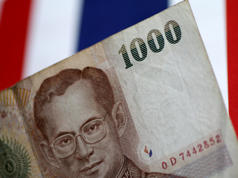Asian Currencies Fall on Trump Tariffs; Baht Falls on No-Confidence Vote

Investing.com - Most Asian currencies weakened early in the week as the US dollar continued to hold strong on the back of new tariffs, while the Thai baht fell sharply on the back of a no-confidence vote in Prime Minister Paetongtarn Shinawatra.
US Dollar Index Remains Firm
The US Dollar Index (DXY), which measures the greenback against a basket of major currencies, rose 0.1% to 104.16, after rising 0.4% last week. The index hit a more than two-week high on Friday, following a period of losses since the start of the year.
Asian Currencies Weaken Ahead of Trump Tariffs
Asian currencies remained muted as markets assessed the impact of new US tariffs set to take effect on April 2. President Donald Trump plans to impose more selective tariffs targeting countries with large trade imbalances with the US, according to a report from the Wall Street Journal.
These measures could affect about 15% of countries with large trade deficits, with major Asian economies such as China, Japan, India and Vietnam among potential targets.
The Chinese yuan edged up 0.2% in onshore (USD/CNY) and offshore (USD/CNH) trade. The South Korean won (USD/KRW) gained 0.3%, while the Singapore dollar (USD/SGD) also gained 0.2%. The Indonesian rupiah (USD/IDR) rose 0.5%, continuing last week's near-1% gain.
Japanese yen falls despite rate hike prospects
The Japanese yen (USD/JPY) fell 0.3%, reflecting broader market weakness. Bank of Japan Governor Kazuo Ueda told parliament that the central bank remains committed to raising interest rates if core inflation reaches close to its 2% target. However, weak economic data dampened optimism.
Japan's manufacturing activity contracted at its fastest pace in a year, with the au Jibun Bank manufacturing PMI falling to 48.3 in March from 49.0 the previous month. The services sector also contracted, with the services PMI falling to 49.5 from 53.7, marking the first decline in five months.
Thai Baht Falls Ahead of No-Confidence Vote
The Thai baht (USD/THB) fell sharply by 0.8% on Monday, as Prime Minister Paetongtarn Shinawatra faces a no-confidence vote in parliament starting March 24. The opposition People’s Party accuses her of economic mismanagement and being heavily influenced by her father, former Prime Minister Thaksin Shinawatra.
